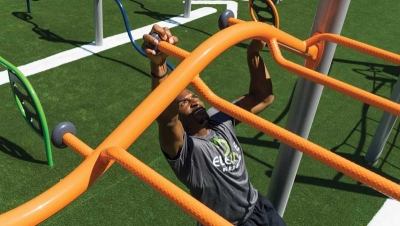No matter your age, it is probable to assume that when you are at play, whatever that means to you, you feel most alive, clear of mind, and stress free. However, we often sacrifice our play time for other, seemingly more "important" activities in our lives. We lose a connection to the fact that play isn't a luxury — it is a necessity, at any age.
Play is as important to our overall health and well-being as any other life sustaining activity we undertake. Play teaches us how to manage and transform our "negative" emotions and experiences. It supercharges learning, helps us relieve stress, and connects us to others and the world around us. We strive to ensure that play is included in our children's lives, at school and at home, to ensure they reap all of its benefits across developmental domains, including cognitive, communicative, physical, and social. Through play, other activities in life can be more productive and pleasurable.
Why then is it so common to find that somewhere between childhood and adulthood, many of us stop playing? We exchange play for work and life responsibilities. We no longer see play time as something we need to do, but something that must be traded for the realities of adulthood. What's more, when we do have free time, we're more likely to zone out in front of the TV or computer than to participate in play. However, creative companies are recognizing the power of play as a beneficial contributor to work productivity and creativity.
The same important benefits reaped by children at play don't stop just because we're older. Innovative companies are realizing this and finding ways to incorporate play into the workplace to promote creative thinking, problem solving, and communication, benefits that have been proven through extensive research on children and play.
Play fosters creative thinking. In 1997, John Kao, the author of Innovation Nation: How America is Losing its Innovation Edge, Why it Matters and What We Can Do to Get it Back stated “I define creativity as the entire process by which ideas are generated, developed and transformed into value. It comprises what people commonly mean by innovation and entrepreneurship.” Creative processes come from the ability to use the imagination. Despite many who will say "I'm just not creative," we all have creative capacities, but often we don't know how to draw on them. By utilizing play to help people overcome their non-creative perception, work teams can have fun contributing ideas, be curious and proactive, and face their fears about vocalizing ideas. Through play, the perception of saying the wrong thing or the fear of rejection is eliminated, providing a clear path to new ways of thinking.
When we play we can solve problems in the context of cooperation. Often, when faced with a problem, people become afraid or uncomfortable and feel that they need to come up with the right answer immediately. Playful problem solving sessions tend to delay the natural instinct to immediately find a solution before the process of thinking it through. Play is directed by the player so people don't feel as anxious or have the need to grind quickly toward some outcome. Play provides improvisation potential and gives pleasure to the participants. Allowing a problem solving session to be more playful encourages creativity and lateral thinking without fear of saying the wrong thing, so that people come up with innovative ideas and fresh approaches for resolving a problem.
A study conducted by the University of Florida confirms the power of play in the workplace. The study found that people who were playful were more engaged, accomplished more, and had a higher level of creativity.
Several companies are embracing this innovative, fresh approach by providing opportunities for play to encourage innovative thinking. Google employees are paid to play beach volleyball, go bowling or scale a climbing wall – activities that are provided at their main campus in California. LinkedIn employees can take a break from answering e mails and re-energize by playing foosball or ping-pong. At Zynga, arcade games grace the hallways.
These innovative companies have redefined the workplace in terms of expected employee behaviors and the rigid, strict roles that are typically set for them. Encouraging playfulness strengthens social bonds, workplace satisfaction, and overall well-being in a way that has benefits for an entire company. By investing some time and effort into showing employees they are valued, companies can expect to see a decrease in turnover and absenteeism, and an increase in productivity, efficiency, health, and morale! By giving ourselves permission to play at work with the joyful abandon of childhood, we can continue to reap its benefits throughout life, while promoting creative thinking, problem solving, and customer communication.
Do you play at work? Let us know what you do by commenting below!
















do you play at work
I will say yes I play at work.it's not as I would at home or off work,yet it is play none the less. thank you and have a wonderful day!!!!!!!!
Add new comment